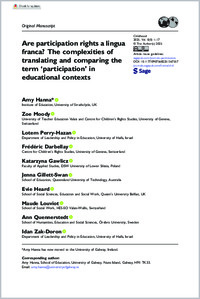Are participation rights a lingua franca? The complexities of translating and comparing the term ‘participation’ in educational contexts
- Hanna, Amy ORCID Institute of Education, University of Strathclyde, UK
- Moody, Zoe ORCID HEP-VS
- Perry-Hazan, Lotem ORCID Department of Leadership and Policy in Education, University of Haifa, Israel
- Darbellay, Frédéric ORCID Centre for Children's Rights Studies, University of Geneva, Switzerland
- Gawlicz, Katarzyna ORCID Faculty of Applied Studies, DSW University of Lower Silesia, Poland
- Gillett-Swan, Jenna ORCID School of Education, Queensland University of Technology, Australia
- Heard, Evie ORCID School of Social Sciences, Education and Social Work, Queen’s University Belfast, UK
- Louviot, Maude ORCID School of Social Work, HES-SO Valais-Wallis, Switzerland
- Quennerstedt, Ann ORCID School of Humanities, Education and Social Sciences, Örebro University, Sweden
- Zak-Doron, Idan ORCID Department of Leadership and Policy in Education, University of Haifa, Israel
- 2025
Published in:
- Childhood. - 2025
English
Children’s right to express their views under article 12 of the United Nations Convention on the Rights of the Child is commonly referred to as ‘participation’. How this term is used in scholarship, policy and practice, however, varies enormously across linguistic and national contexts. This article reports and discusses four complexities associated with translating and comparing the term participation that were identified from a series of international workshops on children’s rights in education. We conclude that further empirical, interdisciplinary research is required to examine these complexities in further depth.
- Language
-
- English
- License
- Identifiers
- Persistent URL
- https://fredi.hepvs.ch/hepvs/documents/332673
Statistics
Document views: 33
File downloads:
- hanna-et-al-2025-are-participation-rights-a-lingua-franca-the-complexities-of-translating-and-comparing-the-term: 36
